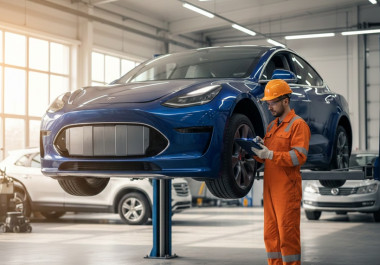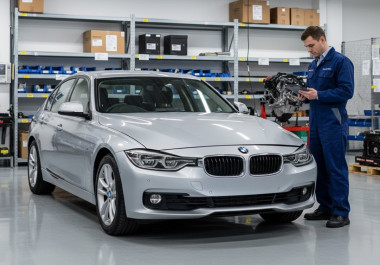Selling a car can be a real headache. If you try to sell it privately, you’re often buried in silly offers and time-wasters. Taking it to a dealer for a trade-in usually means accepting a price that’ll make you wince. But there’s a better way, a method that’s been the beating heart of the motor trade for decades: sending it to auction.
Putting your car up for auction isn’t just about getting rid of it quickly; it’s about putting it on a proper stage in front of people who are there to buy. It’s an efficient, and often very profitable, way to move a motor on. Whether you’re a business shifting fleet vehicles or just an individual making way for a new model, understanding the ropes is vital. Here is a no-nonsense guide to selling your car at auction, filled with the kind of practical advice that only comes from years spent around engines and gavels.
The Upside of the Auction Block
A lot of sellers get a bit jittery about auctions, thinking it's all a bit of a gamble. When it’s done right, though, it’s one of the sharpest ways to sell.
-
It’s Over and Done With, Fast: An auction is a one-day event. Instead of spending weeks fielding calls, your car can be sold and the money sorted in a remarkably short space of time.
-
A Bit of Healthy Competition: Nothing gets a price moving upwards like a good old-fashioned bidding war. The buzz on the auction floor can push that final sale price far beyond what you’d achieve privately.
-
Casting a Wider Net: Auctions draw in all sorts. You get private buyers hunting for a bargain, dealers looking for stock, and specialists on the prowl for something particular. That means more eyes on your motor, from all walks of life.
-
What You See Is What You Get: The whole process is transparent. You agree on a minimum price, and the market does the rest. It’s a real, market-driven result, and platforms like RAW2K open that market up across the whole of the UK.
Is Your Car Right for the Auction Block?
Before you book a spot, take a moment to size up your car honestly. Is it a good fit for the auction environment?
What Sells Well?
Most motors have a place, but some are just naturals for the auction.
-
The Crowd-Pleasers: Everyday models like family hatchbacks, reliable saloons, and popular SUVs will always have hands in the air. They’re the bread and butter of the trade.
-
The Dependable Workhorses: A well-kept commercial vehicle is always in demand. If you have a van or pickup, you’ll find no shortage of interest in the van auctions.
-
The Interesting Finds: Don't write off less common models. Classic cars, performance machines, or even motorbikes can fetch fantastic prices at the right sale. The dedicated motorcycle auctions are a perfect example.
A car’s condition matters, but it doesn't need to be flawless. Buyers at an auction know they’re not in a showroom. As long as you’re straight with them and set a sensible reserve price, even a car with a few honest battle scars will find a new home. To get a feel for what your model might be worth, have a browse through the all cars listings.
Choosing the Right Stage for Your Car
Where you sell your car is as important as what you’re selling. The UK is home to everything from traditional auction houses to slick online platforms.
It’s a bit like choosing a fishing spot; you wouldn’t look for trout in the sea. You need to find an auction with the right kind of buyers for your vehicle.
-
Reputation Matters: Stick with established names that have a loyal following of buyers who trust them.
-
Mind the Pennies: All auctions have fees. There’s usually a fee to list the car and a commission taken from the final sale price. Always read the fine print so you know exactly where you stand. The terms and conditions are always available online for this reason.
-
Specialist or General Sale? If you're selling a pristine classic, a specialist auction is the place to be. For a standard family car, a general sale will have a much bigger pool of potential buyers.
Getting Your Car Dressed for Success
First impressions are everything. A car that’s been properly prepared looks better, inspires confidence, and encourages people to bid higher.
A Good Old-Fashioned Spit and Polish
-
A Proper Clean: Give the car a thorough clean, inside and out. Hoover the carpets, wash the windows, and give the paintwork a good polish. A car that looks cared for gives the impression it has been well-maintained.
-
Fix the Little Things: A blown bulb, a missing bit of trim, or a cracked wing mirror are cheap fixes that make a world of difference. It removes any easy excuses for a bidder to lower their offer.
-
Check the Tyres: Bidders always look at the tyres. If they’re worn, it can be a real turn-off. Good tyres are a simple way to show the car is ready for the road.
Get Your Paperwork in Order
Trust is built on transparency, and a thick folder of documents is the best tool you have.
-
The V5C Logbook: This is non-negotiable. Make sure it's in your name and all the details are spot-on.
-
A Full Service History: This is pure gold. A stamped service book or a neat file of receipts is proof that the car has been looked after properly.
-
A Long MOT: A fresh MOT gives buyers huge peace of mind. If it’s due to run out soon, getting a new one is one of the best investments you can make.
-
Manuals and Spare Keys: Finding the original owner’s manual and any spare keys shows a level of care that bidders really notice.
Setting the Rules of the Game
Before the big day, you need to set your terms. This is all about protecting your investment and managing expectations.
Reserve Price or No Reserve?
This is one of the most important decisions you’ll face.
-
Setting a Reserve: This is your safety net. It’s the absolute minimum price you are willing to accept. If the bidding doesn’t hit that number, the car doesn’t sell. For most private sellers, this is the sensible choice.
-
Going with No Reserve: This is a much bolder strategy. It can generate a lot of excitement because buyers can smell a potential bargain. While it can sometimes deliver a fantastic result, you do run the risk of the car selling for a lot less than you hoped.
If you’re not sure, have a word with the auction staff. They see hundreds of cars come and go every week and can give you solid, realistic advice.
Writing a Listing That Sells
In an online auction, your listing does all the talking. It needs to be detailed, honest, and appealing.
-
The Full Spec: Make sure you include all the key details: make, model, year, mileage, engine size, and so on.
-
Honesty is the Best Policy: Be upfront. Buyers respect honesty. Tell them about the new exhaust, but also be straight about the scratch on the bumper. This builds trust.
-
Shout About the Good Bits: Has it just had a new clutch? Is it cheap to tax? Does it have a great sound system? Mention every single positive.
-
Take Proper Pictures: Use a decent camera and take photos in good daylight. Get all the angles: front, back, both sides, the interior, the dash showing the mileage, the engine bay, and the boot. A good set of photos is worth its weight in gold.
On the Day of the Auction
Whether you’re standing on the auction floor or watching online, it’s always an exciting time.
-
At a Physical Auction: The car gets its lot number and is put on display for viewing. When its turn comes, the auctioneer takes the stage. If bidding hits your reserve, the hammer falls, and it's sold. Simple as that.
-
At an Online Auction: The car is listed with its description and photos, and bidding takes place over a set time. You can watch the action unfold from anywhere.
You see it all the time in this business: someone brings in a decent car, but they haven't made an effort. The inside is a mess, and there’s no paperwork. It fails to sell. They bring it back a few weeks later, but this time it’s gleaming, and a folder of receipts is sitting on the passenger seat. The car sells for hundreds more than the previous attempt. It just goes to show you that a little bit of effort pays off every single time.
After the Hammer Falls
Once your car is sold, there are just a few final bits of business.
-
Payment and Paperwork: The auction house handles the money. They’ll collect payment from the buyer, take their fees, and send the balance to you. They will also help you fill out the V5C correctly to transfer the ownership.
-
If It Doesn’t Sell: Don’t lose heart. If the car doesn’t meet its reserve, you can usually enter it into another auction. You might need to adjust the reserve, but you get a second bite at the cherry. Alternatively, if the car is at the end of its road, a service to scrap my car could be the answer.
Final Thoughts for a Successful Sale
Selling at auction is a brilliant tool when used correctly. Prepare the car properly, be honest, and set a realistic price. Don't be afraid to ask the auction staff for their opinion; their experience is invaluable. For any questions, the contact page is the place to go.
Follow these steps, and you’ll give yourself the best possible chance of getting a great price. Now, get that car ready, and good luck.




